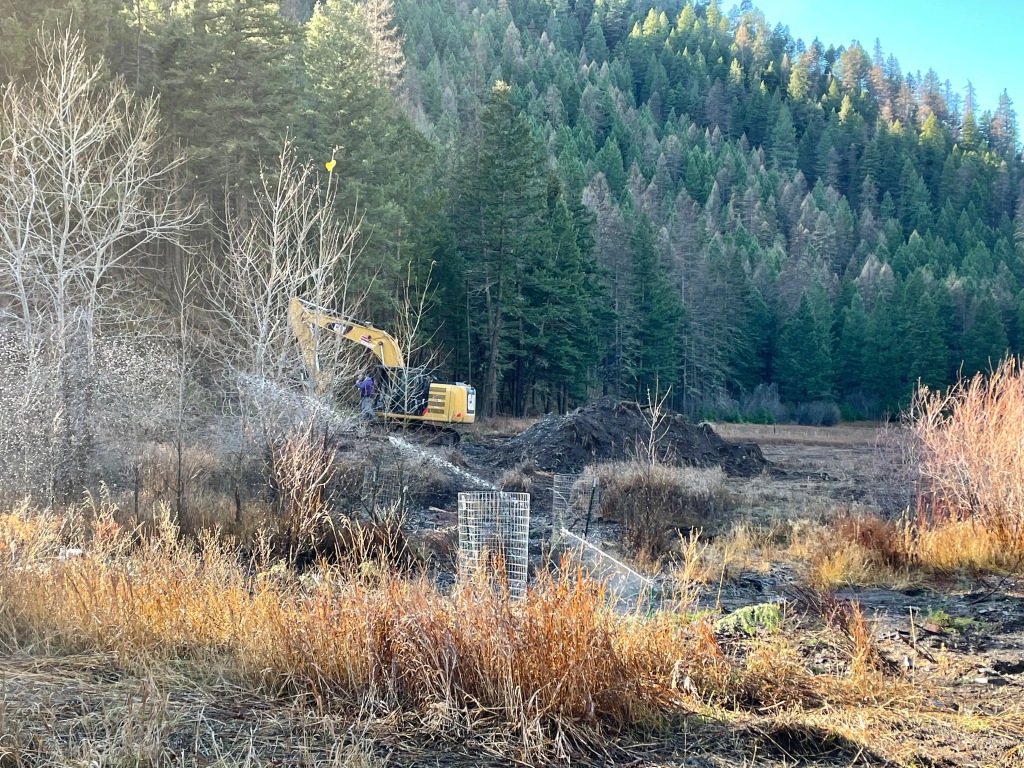
Every year I look for an opportunity to paddle in November. Though there is snow in the mountains and frost in the valleys, paddling in November is my way to honor a father who died at this time of the year when cranberry bogs and raspberry thickets near his home blazed against a blue sky. Though he never paddled a sea-kayak, he was never without a boat. A final paddle begins to repay the debt to a man who introduced me to life on the water. This year I kept my eye out for the perfect day—a high temperature around 50 degrees, water conditions almost as warm, waves not raised by the energy of autumn’s first storms. I found that day on November 5. But two days before I was ready to paddle along a shore lined with golden larch trees, I received an email. It contained an invitation to return to the upper watershed of Miller Creek, a tributary of the Bitterroot River, not far from where we live, upstream of water we use every day.
The Clark Fork Coalition had received a grant from the Environmental Protection Agency and Montana’s Department of Environmental Quality to work in two riparian areas along the stream, a stream considered “impaired.” Four years in the planning phase, the two projects, both on private land, had many goals. Heavy equipment operators would stabilize banks so less sediment flowed downstream; new meanders in the stream course needed to be built to slow the current and create holding water for native fish; woody debris in the form of logs needed to be anchored in the banks; willows would be placed in trenches parallel to the stream and finally, cottonwood trees and red-osier dogwood needed to be planted to maintain cool water temperatures, provide habitat for avian migrants and offer a degree of protection for fish under the eye of osprey and kingfishers.
After weighing the options, and knowing there is no guarantee of a good day at this time of the year, I chose to return to the stream, even though I had devoted a day to the project the previous week. We have so few opportunities to translate deep concern for the earth into concrete action, action that makes a difference to a land owner and to wild creatures waiting for improved conditions. Here was a rare opportunity to practice what our Jewish community calls Tikkun Olam, or repair of the world. Under the direction of two hearty and motivated young women from the Coalition, volunteers from Missoula drove into the frosty Miller Creek canyon, carried picks and shovels and armloads of desire into and across a little stream waiting to be repaired. As we worked we were amazed to see fish take up position in the newly configured stream in less than an hour after pools were excavated and the stream gradient was changed.

When Congress seems bogged down in negotiations on social and physical infrastructure bills, while the earth itself seems stuck on a hot plate, an email arrived inviting us to mend a few hundred yards of one watershed. We were given a chance to increase the likelihood that a warming earth will lose fewer of its adapted species and water will flow clean and clear upstream of where we live. Spending a day digging holes in the rockiest of soils, pounding T-stakes, and securing fencing around saplings so deer and elk will not devour them the first night after they are planted, seemed like an even better thing to do than paddle Bluebird one last time this year. Were he alive, I believe my father would understand.


Yes your father would understand. Your post is a lovely and loving tribute to him and to the earth. I love this phrase of yours “…picks and shovels and armloads of desire…’ I hope coming days will still afford an option of getting out on the water for a paddle.
Thanks, Babsje. You always seem to pick out the best parts. I look forward to catching up on your posts.
I hear your paragraphs as stanzas of a tikkun olam poem and a father poem with layers of meaning, rhythms of words, patterns of sounds, images of growth and change, and metaphors. Babsje points to a beauty of a metaphor. Thank you for writing this, posting it so we can read and hear it, and for doing the work
Donna, thank you for your generous assessment. I came home from this project covered in earth.
I appreciate the thoughtfulness you brought to this day, Gary — a day woven through with purpose, service in community, and remembrance of your father.
Sue, thank you for recognizing the thought I put into such things. Conscious choice seems to be one of the gifts that goes with life at this stage.
This is such a great essay Gary. I can feel the decision . . . and the cool air . . . and the sweat . . . and the love for both the earth and your father. Fantastic. Thanks for sharing.
Such a perfect way to memorialize Grandpa Wayne and to provide a little healing to an important headwater.